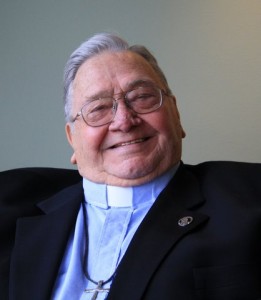Paul Preaches in Europe
By the Rev. Canon Don Beatty
 In my last column, Paul and Silas were in Troas, where they met Luke, who, along with Timothy, became part of the mission team. In reading the Acts of the Apostles, we see the beginning of the “we” passages in Acts 16:10. Now Luke was an eye-witness.
In my last column, Paul and Silas were in Troas, where they met Luke, who, along with Timothy, became part of the mission team. In reading the Acts of the Apostles, we see the beginning of the “we” passages in Acts 16:10. Now Luke was an eye-witness.
After leaving Troas, Paul had a vision (from the Holy Spirit) of a man from Macedonia calling him to come over and help the people there. The team travelled across the Aegean Sea to Neapolis. From there they went to Philippi, a major centre in Macedonia. Here the Gospel was preached for the first time in Europe. We date this event to about 52 CE
There was no synagogue in Philippi, so the Jews met at a riverbank. Paul preached to them about the coming of their Messiah, Jesus, who was crucified and rose from the dead. A number were converted, including Lydia, a dealer in purple cloth, a sign of the wealthy class. Paul and his team stayed with Lydia for a time in Philippi.
Next we meet a slave girl who followed Paul, shouting out that he was a servant of the most high God. This became rather distracting and Paul cast out the demons within her. However, these demons enabled her to tell fortunes, and with this power gone, her owner complained to the authorities and soon Paul and Silas were in jail.
In jail, Paul and Silas were singing hymns and praying, when around about midnight a violent earthquake shook open the jailhouse doors. The jailor was about to commit suicide when Paul called out to him, “No one has left the prison.” The jailor realized that these men were special and he took them home, where Paul preached the Gospel. The jailor and his whole household were baptized. This is one of the few passages where a whole household is baptized, suggesting the possible inclusion of children. Thus, the three sections of society were included in Paul’s mission: the wealthy class represented by Lydia, the lower-class slave girl, and the solid middle class represented by the jailor and his family. The Gospel of Jesus reached out to all levels of society.
Paul and Silas were released by the magistrate in Philippi and, after a short visit with Lydia, they moved on to Thessalonica. Luke seems to have stayed in Philippi, for the “we” passages end here and begin again in Acts 20:5, when Paul came back to Philippi during his third missionary journey.
Thessalonica was the capital of Macedonia. Here Paul, as was his custom, preached at the synagogue, with some success. A number of Jews, God-fearers and some prominent women were converted.
From Thessalonica, the team moved to Berea, and again Paul preached in the local synagogue with some success, until some Jews from Thessalonica came to Berea and stirred up the people. Paul fled, leaving behind Timothy and Silas to build up the church there.
Paul travelled to Athens, the centre of Greek culture. Most of the Athenians took great delight in discussing and debating the latest religious and philosophical thoughts. Paul would get a good hearing here.
Again, Paul went to the local synagogue and preached with some success. But it was in the marketplace that he impressed the local philosophers of the day. They even invited him to the Areopagus, which was the meeting place for the philosophers. It was here that they decided all religious and moral issues, and it was somewhat of an honour to be invited to address the philosophers in Athens.
Paul began by complimenting them on their religious nature, especially pointing out the altar to the “unknown god.” He said, “It is this God I wish to proclaim unto you.” This is the God who created the heavens and the earth, he continued. He is the Lord of all and does not dwell in temples made by human hands. He gave us life and breath. He made from one man all nations so that humans may inhabit the whole earth. This God is very close to us and wants us to reach out to Him. “In Him we live and move and have our being.” This last sentence was a direct quote from one of their ancient poets, Epimenides, who lived about 600 BCE.
Paul went on to talk about Jesus, the man God raised from the dead. At this point he lost his audience. The Greek mind could not accept the resurrection of a body. They believed in the eternal soul, but not the body. But some believed! Paul soon left Athens and moved to Corinth, his longest stay during his second journey and the beginning of his written work. Next month we will examine this mission and his two letters to the Thessalonians, his first written letters. Enjoy the dialogue.
The Rev. Canon Don Beatty is the honorary assistant at St. Luke, Dixie South, Mississauga.